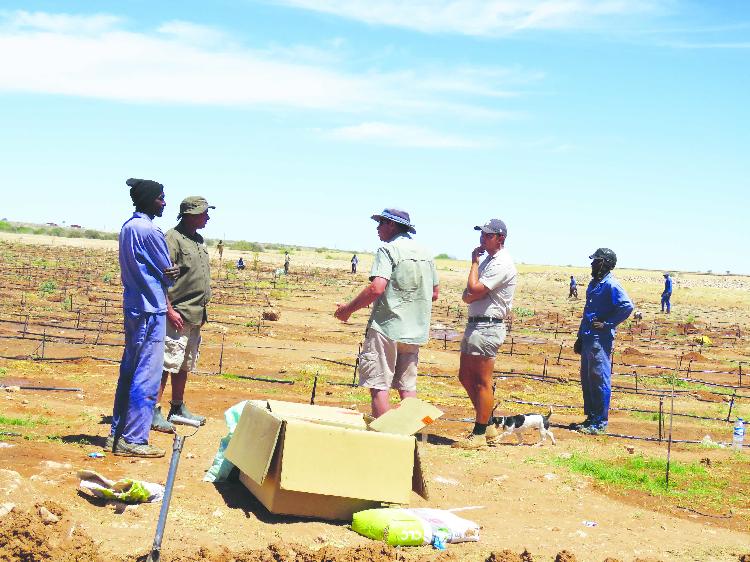Africa-Press – Namibia. MATTHEW DLAMINI at STAMPRIET AFTER a tour of the N$100 million Roots agricultural project at Stampriet on Saturday, regional governors seemed to agree that farming should not only be a retirement project for the elderly, but can also be a successful business venture for young people.
Laura McLeod-Katjirua, the Khomas governor, Elia Irimari, the Oshana governor, Salomon April, the Hardap governor, Aletha Frederick, the //Kharas governor, Lawrence Sampofu, the Zambezi governor, Bonifatius Wakudumo, the Kavango East governor, Sirkka Hausiku, the Kavango West governor, Penda ya Ndakolo, the Oshikoto governor, and Erginus Endjala, the Omusati region’s governor were taken on a tour of the farm by one its directors, Salomon Kalondo.
The governors toured the apple orchards, vineyards, asparagus fields, and the poultry project. They also stopped at the project’s school, which caters for children up to Grade 5, and visited a smallholder farmer’s 10-hectare plot.
Host governor Salomon April said the project was something the nation must be proud of. EMPOWERMENT In addition to production at the farm, which employs about 350 workers with different levels of expertise, he said he was particularly impressed with the project’s empowerment element.
Kalondo said small-scale farmers will have title deeds for their plots as Roots has been incorporated into Stampriet. A one-hectare plots cost N$350 000, while a 10ha plot goes for N$700 000. Kalondo said investors would, however, need about N$2,6million to get the project running.
“We will help them set up a poultry project, build a house and provide each farmer with 20 000 litres of water every day. We will help them run their operations and they will also market their produce through us,” he said, adding that the chicken business is seen as a low-risk entry point for investors.
The farm draws water from the Stampriet aquifer. April said the project was worth replicating in all regions of the country, although funding could be a challenge.
“I have started talking with Roots and the Namibia University of Science and Technology (Nust) to link the two so that we can have a campus here,” he said. Roots are in consultation with Stellenbosch University in South Africa on some of the projects at the farm.
Kalondo said Roots has already started a poultry training programme for young people, seconded by Dundee Smelters, as part of the Tsumeb company’s social responsibility programme.
Roots has its own poultry section, but the full capacity of the company’s broiler unit does not even represent 5% of current chicken import levels of 16 800 tonnes per year.
‘IN AWE’ McLeod-Katjirua on Saturday said she was initially sceptical about the project, but after the tour she was in awe.
“. . . we are impressed. My region is an urban setting and the challenge will be the provision of land for such a project, but it would be proper for those in local and regional authorities to come here and see for themselves . . .
“This is heaven on earth . . .” she said. Irimari said he would promote changing traditional farming methods in rural areas.
“We must encourage people to adopt sustainable intensive farming on smaller pieces of land instead of having vast tracts of land which they cannot farm profitably because of a lack of input, labour and capital,” he said.
He was happy to learn that Roots was the biggest commercial producer of apples in the country. Irimari said people should grow products that do well in their areas and add value to them.
Endjala said the visit to the project was an eye-opener to the concept of urban agriculture. “I think we have now learnt how to incorporate urban areas and agriculture into modern towns. I will take some of the lessons I learned back to my region to empower the youth,” he said.
Ya Ndakolo said he would consult people in his region to see what they can replicate. Frederick said she would initiate development projects in the //Kharas region, particularly at the underutilised Neckartal Dam.
“I want to pilot such a project at Neckartal Dam in conjunction with the World Food Programme. We want to acquire 2 000ha and divide it into plots for smallholder farmers,” she said.
“Covid has taught us to grow our own food to reduce dependence on imports, and enhance exports,” she said.
Wakudumo said he will organise a trip for young people to Stampriet and replicate the project in his region. Sampofu said a similar project would be a success in his region, with abundant water for irrigation.
“Youths should not only look for jobs in offices, but must work the land to grow food. They must realise they can create their own employment through farming,” he said. ENDING HUNGER
World Food Programme (WFP) country director George Fedah, who also toured the project, said the WFP had initiated agricultural partnerships with locals in most regions, and would implement some of the activities at Roots.
“This is our efforts to end hunger among vulnerable communities in the country,” he said. The effect of the Roots project on the economy of Stampriet is visible in many areas.
Petro Hayman of the Stampriet Historical Guest House said although Covid-19 has hit their family business hard, Roots is bringing them a lot of clients.
“Roots has really breathed economic life into this town,” she said.






